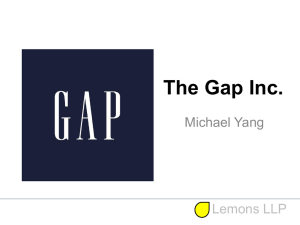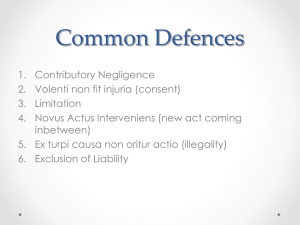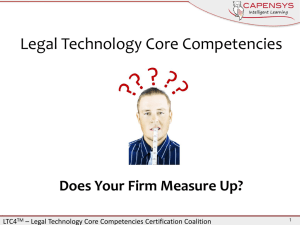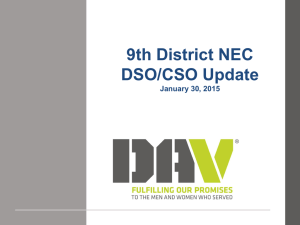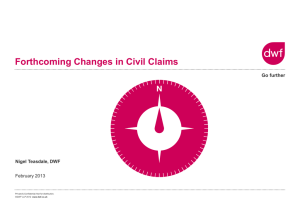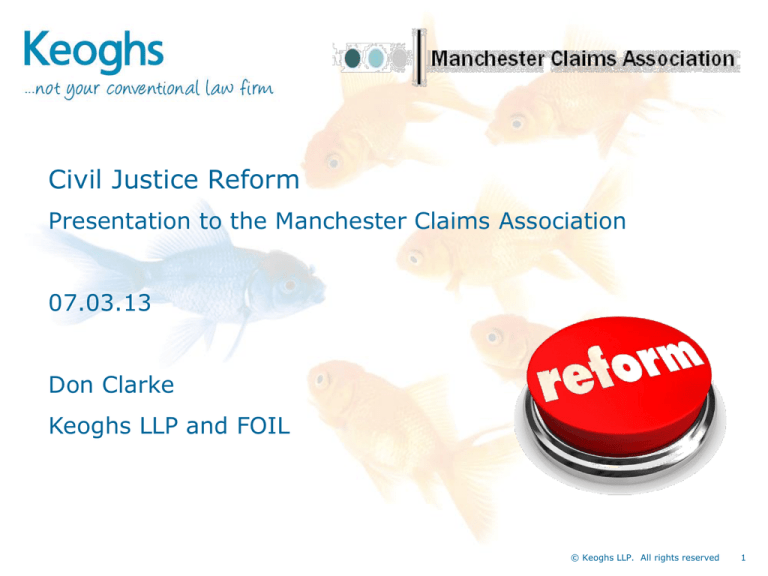
Civil Justice Reform
Presentation to the Manchester Claims Association
07.03.13
Don Clarke
Keoghs LLP and FOIL
© Keoghs LLP. All rights reserved
1
Agenda
• Brief reminder of Jackson package
• Where are we up to?
• What is for April and what is delayed
• Likely timetable for coming months
• Whiplash and the SCT
• Post April 2013 landscape
• Observations and Conclusions
© Keoghs LLP. All rights reserved
2
Key components of Jackson
ATE
premium
Success
fees
Notional
premiums
Part 36
10% uplift
In PSLA
QOCS
DBAs
Referral
fees
Fixed
costs
Proportionality
© Keoghs LLP. All rights reserved
3
April 2013 – what’s coming – almost
certainly!
•Referral fee ban
•Non recoverability of ATE premium
and success fees
•Damages Based Agreements
•10% uplift in PSLA (closer to 20%)
•Qualified One Way Costs Shifting (QOCS)
•New Part 36 & new Rule on Proportionality
•New Portal fees for RTA claims <£10,000
© Keoghs LLP. All rights reserved
4
April 2013 – what’s delayed
FRC’s for RTA > £10,000 and EL / PL
FRC’s to £25,000 – end July 2013.
Vertical & horizontal extension of
the portal – end July 2013.
New < £25,000 protocols – end July
2013
July 2013 – date tbc.
© Keoghs LLP. All rights reserved
5
Referral fees ban
•
Enforced by SRA – outcomes based regulation
•
Restrictions
– Only B2B claims
– Only those regulated by FCA, Bar Council,
SRA and CMC Regulator
•
Does not catch credit hire, body shops, medicals
•
Competition Commissioner conducting separate
review of motor market
– Preliminary report, Sept 2013
Can – and will –
be circumvented by ABS
A dislocation of certain parts of
the claimant supply chain, but
for how long?
© Keoghs LLP. All rights reserved
6
ATE premium
• LASPO Act 2012 - Sections 46 & 47
– Prohibit recoverability of ATE
premium from defendant
• Where applicable
– Accident date or ATE policy
incepted after 1st April 2013
• Premium no longer recoverable
from paying party
• Premiums claimed where no
entitlement exists
• Backdating of policy inception
– Accident prior to 1st April
2013 but solicitor instructed
after that date
© Keoghs LLP. All rights reserved
7
Success fees
• LASPO Act 2012 – Section 44(6)
– Removes Court’s power to order
a party to pay success fee to
another party under a CFA
• Where applicable
– Date of CFA after
1st
April 2013
• Success fee payable to claimant’s
solicitor no longer recoverable from
compensator
• Success fees claimed where no
entitlement exists
• Backdating of CFAs
– Accident prior to 1st April
2013 but solicitor instructed
after that date
• Claimant pays success fee from
damages – capped at 25%
© Keoghs LLP. All rights reserved
8
Damages based agreements
• LASPO Act 2012 - Section 45
– Allows use of DBAs in
personal injury claims
• Capped at 25% of the claimants
damages
• CFAs more likely to be used
unless SCT increases
• Incentivises claimant lawyers to
maximise damages
• Damages inflation
• Increase in heads of damage
claimed for
• More willingness to press to
an assessment of damages
• More “expert” evidence to
support additional damages
© Keoghs LLP. All rights reserved
9
10% PSLA uplift
• Simmons v Castle 2012
– CoA set out 10% uplift in PSLA
in all judgments handed down
after 1st April 2013
– Exception
• Where claimant has already
entered into CFA before
that date
• Claims for 10% uplift where
no entitlement
• PSLA inflation given the
closer link between damages
and costs?
• Impact on existing claims
• Uplift applies to all non CFA cases
© Keoghs LLP. All rights reserved
10
QOCS
• CPR 44 - Section II
– Defendant cannot make losing
claimant pay their costs except
in exceptional circumstances
• No practical deterrent to
fraudulent claims – an increase
in fraud?
• Must be PI element to claim for
QOCS to apply
• Increased use of defendant P36
• Will not apply where a CFA / CCFA
was in place prior to 1st April 2013
• Clarification of QOCS rules via
satellite litigation
– Part 36 trumps QOCS
– What does “fundamentally
dishonest” mean?
© Keoghs LLP. All rights reserved
11
QOCS – adverse costs orders
QOCS
Enforcement
Permission needed
Mixed claim exception
All orders in favour of defendant may be enforced to
their full extent provided the court considers it just.
Applies to:
1. Subrogated claims and credit hire claims
2. To the extent that the defendant incurred costs in
dealing with these claims
Costs Cap
General Rule
All order in favour of the defendant may be set off
against and to the extent of damages and interest
recovered by the claimant.
Applies to:
1. Claimant's failure to beat defendant's CPR 36 offer
2. Costs orders obtained against claimant in the
proceedings
© Keoghs LLP. All rights reserved
12
QOCS – adverse costs orders
QOCS
Enforcement
No permission needed
Fraud exception
Orders can be enforced to the full extent where the claim is
found, on the balance of probabilities, to be fundamentally
dishonest.
Applies to:
Allegations of fraud that will be determined at trial:
(a) In all case that proceed to trial
No Costs
Cap
(b) In exceptional circumstances only where case settles
before trial
(c) Upon application if claimant discontinues the claim
Strike out exceptions
Orders may be enforced to the full extent of the order where
proceedings are struck out.
Applies to:
A claim being struck out because:
(a) There was no reasonable ground for the claim; or
(b) The claim was an abuse of process; or
(c) The conduct of the claimant or the claimant’s solicitor
obstructed the just disposal of the claim (such as failure to
comply with a rule or court order)
© Keoghs LLP. All rights reserved
13
Part 36
•
LASPO Act 2012 - Section 55
– Empowers Court to award additional
damages in prescribed
circumstances
•
CPR 36.14(1)(b) also amended
– Where judgment is at least as
advantageous to claimant as
claimant’s CPR 36 offer they are
entitled to additional amount
• Damages <£500k
• +10% of amount awarded
• Damages >£500k
• +10% of first £500k plus
5% of any amount over that
• Multiple CPR 36 offers
against different heads of
damage?
• Late CPR 36 offers made
close to trial?
• Low CPR 36 offers to settle
in potentially fraudulent
claims?
• Capped at max £75,000
© Keoghs LLP. All rights reserved
14
Proportionality
• CPR 1.1 amended
– Court must deal with cases “at
proportionate cost”
• Court will only allow costs which
are proportionate to the matters
in issue
• Costs which are disproportionate
can be disallowed - even if they
were necessarily incurred
• Hopefully a more robust approach
from courts
• If defendant’s conduct causes
claimant to incur cost then very
likely that will be recoverable
• More litigation to determine if
costs are deemed proportionate
• Use of “Costs Budgeting” to
obtain prior approval to costs
being incurred
© Keoghs LLP. All rights reserved
15
FRC’s
• RTA < £10,000 – end April 2013
• RTA > £10,000 + EL / PL to £25,000 – end July 2013
• RTA to £10,000 – trigger to be date notified in portal and not
accident date
• EL disease “fall out” cases to exit FRC regime and remain on
hourly rates
• In cases £10,001 - £25,000, the claimant lawyer can seek
independent quantum opinion (eg Counsel) “where justified”
• A positive step forwards but what behaviours will the non portal
costs structure drive
© Keoghs LLP. All rights reserved
16
Whiplash and the SCT
• Consultation closes on 8th March 2013
• Three key issues
1. Improving the quality of medical
evidence
2. Increasing the RTA SCT to £5,000
3. The “catch all” Question 8 – is
there anything else?
• A key consultation paper but what
about joined up thinking?
• Classic potential example of
“unintended consequences”
© Keoghs LLP. All rights reserved
17
Conclusions
• Claimant’s to have some “skin in the game”
• Insurers no longer paying ATE and success
fee
• Part 36 to counter QOCS
© Keoghs LLP. All rights reserved
18
BUT
• New rules - immersed in satellite litigation?
• Claimant lawyers
– Will they try to circumvent new process and drive
more cases to litigation?
– Use of Part 36 as an aggressive weapon
• QOCS - will not deter fraud; could drive frequency
• Damages - upward pressure
• Costs disputes – which regime applies and when?
• Referral fee ban – largely ineffectual
• Ratcheting of costs on portal “exit” cases?
© Keoghs LLP. All rights reserved
19
Conclusions
• Change is coming and will commence April 2013
– BUT fragmented change with more to follow
• There will inevitably be skirmishes around the new rules /
processes
• Issues remain as to timing of implementation
and transitional arrangements
• Numerous issues remain for insurers re frequency, severity,
costs, fraud and litigation
© Keoghs LLP. All rights reserved
20

